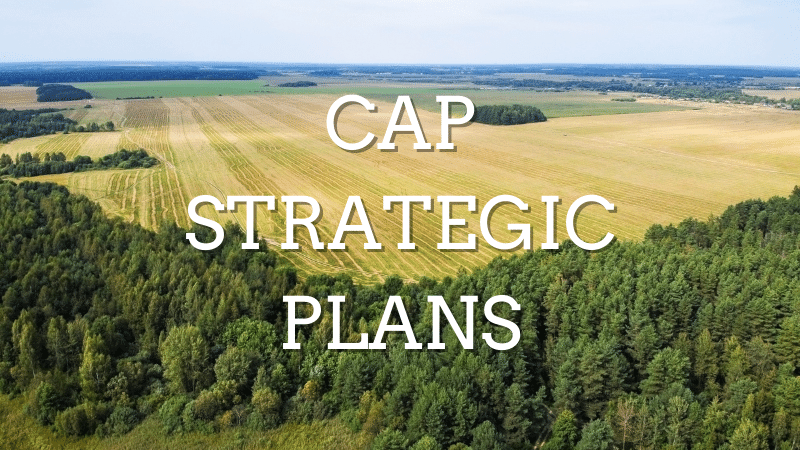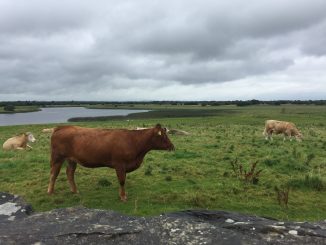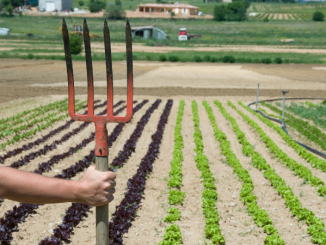By Guus Geurts
As discussed in the first article of this two-part series, decades of trade liberalisation enforced by the World Trade Organisation (WTO), World Bank, International Monetary Fund and several bilateral trade agreements largely contributed to the current economic instability in agriculture, but also to the climate and biodiversity crises. Family farmers in the EU and the Global South face unstable low prices and lose access to their land because of priority to export-led production. Meanwhile, climate change and biodiversity depletion is already putting large populations at risk of hunger. In this second article, I reflect on the effectiveness of the Farm to Fork Strategy and new proposals like the deforestation law within the WTO regime and current trade agreements and their effects on the Global South. I will then propose a number of reforms within trade policy, CAP and other policy areas that could induce a shift towards a worldwide just and environmentally friendly agriculture and food supply, based on Food Sovereignty.
I would like to thank Niek Koning and Gérard Choplin for their very useful comments.
Can the Farm to Fork Strategy be effective?
In May 2020 the European Commission (EC) presented the Farm to Fork strategy (F2F) as part of the Green Deal. The fact that the EC aspires to an integral and coherent policy within food supply is a big step forward. The intention to internalise environmental costs in the price for consumers is encouraging. However, this can’t go hand in hand with the CAP and F2F objective of increasing competitiveness. Competition on the world market leads to striving for the lowest costs of production. European farmers will resist stricter environmental regulations and taxes if they do not see them reflected in their prices.
The EU recognises that the current trade agreements lead to unfair competition for European farmers. They have to comply with stricter rules concerning pesticide use, animal welfare and labour conditions compared to farmers from countries with which the treaties have been concluded or are being negotiated. This is the result of trade agreements and World Trade Organisation (WTO) lacking regulations on Processes and Production Methods of import products. The sustainability chapters in CETA, EU-Mercosur and other Free Trade Agreements (FTAs) are not binding nor enforceable. So, for the time being, this unfair competition lives on. It is therefore not surprising that some (mainstream) farmers’ organisations have reacted negatively to higher environmental targets in F2F.
As explained in Part 1 of this article, because of CAP reforms, farmers are facing unstable prices which often don’t cover their costs. As a response, the EC is only proposing to strengthen the position of farmers in the food chain, for example by facilitating cooperation within sustainable collective initiatives of farmers. But by not coupling those measures with fair market regulation, the EC undermines the effectiveness of its own strategy.
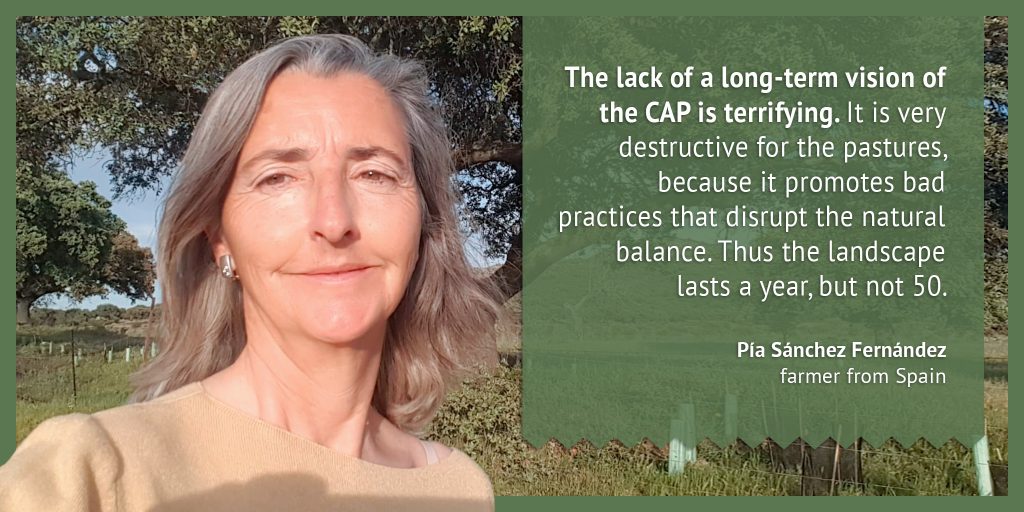
Moreover, through decades of WTO ruled agricultural liberalisation in the Global South, developed countries, including the EU, have shifted southern agrarian systems away from nourishing agriculture:
- Too little priority has been given to self-sufficiency in feed and specific food products. The EU, by importing specific commodities such as palm oil, soy and agrofuels, has been encouraging disproportionate use of land and water resources in the South.
- The way multilateral climate policy is shaped allows for exporting greenhouse gas emissions; the country who produces is accounted for emissions and not the one who consumes. Through WTO and FTAs, the EU exported its pollution to countries such as Brazil, Indonesia and China.
- Dumping in the Global South is still fuelled by EU subsidies, harming small farmers and their ability to invest in future food production and food security.
In the end, populations who have the least responsibility for the climate crisis will be the most affected by it. And their ability to ensure food security and develop food sovereignty has been sacrificed in order to increase their export potential towards the North. Overall, even though the F2F is laying down some crucial advances towards sustainable farming, it falls short in addressing the tension between promoting international trade in agriculture and protecting local food systems.
New Regulations to handle the opposition
Even though unwilling to question the fact that trade liberalisation is a threat to the F2F, and in order to handle growing negative responses to new FTAs, the EU is proposing new regulations in order to ensure compliance of the F2F standards on imported commodities and promote the global transition to sustainable food systems.
Proposal for a regulation on deforestation-free products
In November 2021 the European Commission presented its draft regulation for deforestation-free supply chains. The proposed regulation would require all companies selling beef (including leather), soy, palm oil, timber, coffee and cacao in the EU market to conduct “due diligence” to prove they have not caused deforestation or forest degradation. There would also be sanctions on companies’ illegal or deforestation inducing products[1].
The good news is that the EU finally acknowledges that government regulation is necessary. Indeed, voluntary schemes by the corporate sector and some NGOs have not been effective. Greenwashing platforms such as the Round Table of Responsible Soy and the Roundtable of Sustainable Palm Oil have failed to address forest degradation.
Nevertheless, some flaws should be corrected in order to make the proposed regulation really effective:
- Some key products, such as sugar, bioethanol, processed meat and rubber, are missing from the regulation. Mineral extraction, which is often accompanied by considerable forest destruction, is also not covered.
- The proposal excludes other ecosystems from its scope, such as wetlands, grasslands and savannahs, the latter being mostly destroyed to make way for soybean monocultures in Latin America.
- The regulation will rely on producer country laws to determine whether goods are linked to human rights violations, like land grabs. In a country such as Brazil, this would mean relying on the Bolsonaro government to protect Indigenous rights, something it has willingly avoided.
- The proposal does not consider how to ensure that smallholders are able to comply with the regulation. Yet, as Obed Owusu-Addai, Co-Founder and Managing Campaigner at EcoCare Ghana, explains, “it is of utmost importance that smallholders are supported to comply with the regulation, especially in sectors like cocoa, where smallholders are responsible for a significant part of production”.
- The EU keeps on using natural resources in the Global South for luxury products and keeps on, at least indirectly, driving deforestation. Products that come directly from deforested areas could be sold to China, while the EU imports so-called ‘sustainable products’. By being part of total demand the EU’s consumption is still responsible for – in 2017 – 16% of tropical deforestation[2].
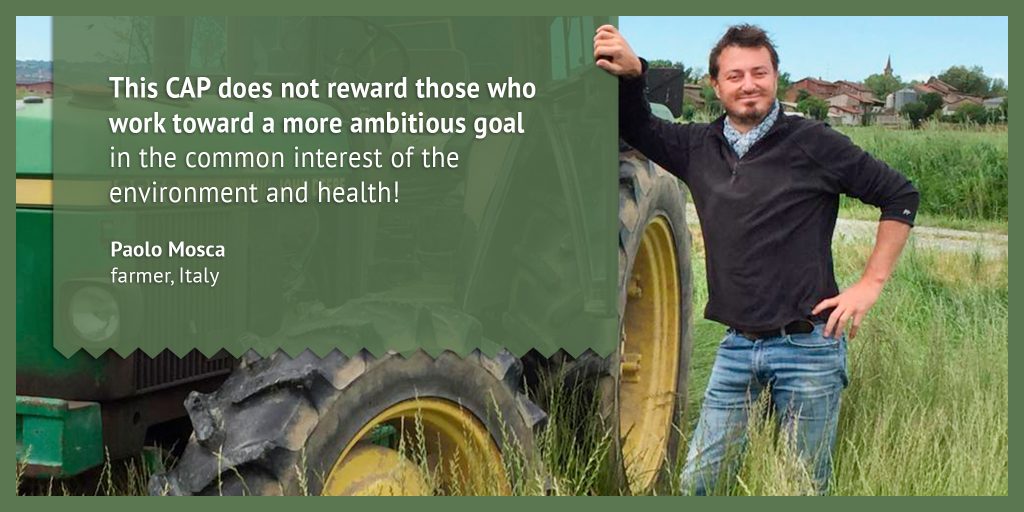
A Trojan Horse for the EU-Mercosur Free Trade Agreement ?
Critical civil society organisations within the Seattle to Brussels network view this deforestation law as an attempt to handle the very critical response to the EU-Mercosur FTA, which was provisionally concluded in 2019. If ratified, this FTA would have dreadful consequences, as highlighted by The Trade Otherwise coalition in an analysis partly based on interviews with people from the Mercosur.
In Mercosur countries, increased soy, meat and sugar production for the European Union will go hand in hand with the destruction of nature and the violation of land rights of small farmers and Indigenous peoples. Eddy Ramirez of the Hugo Foundation in Paraguay who is interviewed in the Trade Otherwise analysis fears the agreement will mean even greater problems for smallholders: “The deal will drive
people from their land and create more displaced persons. The use of pesticides – part of which are banned in the EU – is horrific for the environment, the water reserves and fish, and therefore, for traditional fisheries. The majority of these people are already struggling, so the consequences will be huge.”
The FTA will also deepen the gap between continents. It is a neo-colonial deal that specifically targets the export of raw (mining) materials and (luxurious) agricultural products from Mercosur, in exchange for industrial products from the EU with a large added value. South American industrial companies and workers will be hit by competition with European cars, textiles, machines and more. Tato Figueredo of Argentina’s Institute of Popular Culture sums up the situation perfectly: “Free trade agreements deepen historical injustice and present a legal framework that enshrines this unfair economic system. It endangers vital water systems and the food system, and causes rural poverty.”
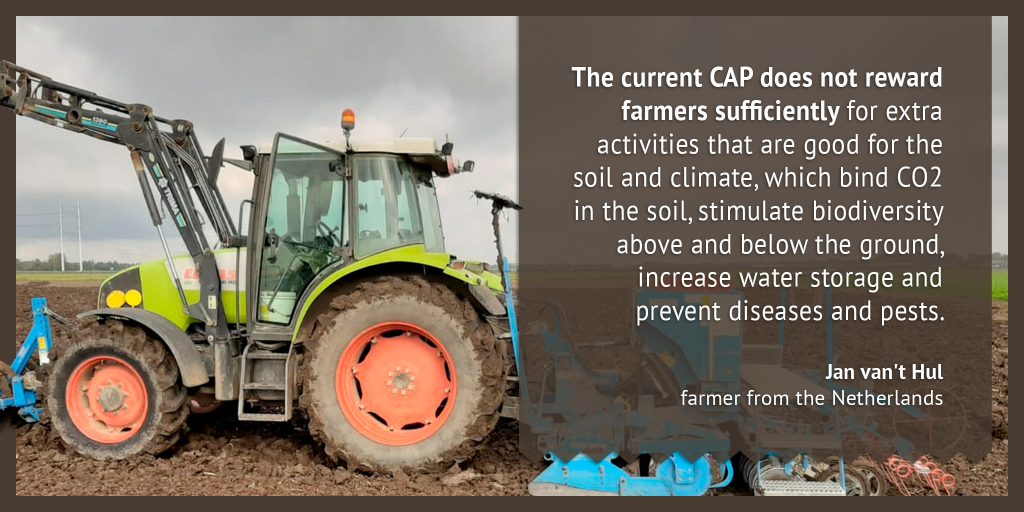
Additional EU propositions
The regulation for deforestation-free supply chains is not the only proposition made by the EC in trying to improve currently unjust and environmentally destructive trade policy. In March 2022, the Draft Mandatory Human Rights and Environmental Due Diligence Directive was presented, with the objective to make EU companies responsible for human rights and environmental harms during the whole supply chain. As part of the Green Deal, the EU also made a proposal to implement the Carbon Border Adjustment Mechanism (CBAM) on energy-intensive imports from third countries, preventing the risk of carbon leakage. Importers would then pay the same carbon price as domestic producers under the EU Emission Trading System. Unfortunately, the proposed CBAM would initially leave agriculture out of the targeted sectors. Another initiative, which was promoted as one of the main objectives of the French Presidency of the Council, is the implementation of mirror clauses on imports[3]. All imported products would have to comply with EU environmental, labour and animal welfare standards. But it is still unclear if it could be WTO-compatible.
Even though those measures would mean improvements, the obligation to comply with WTO rules reduces their scope and overall chances of success. Moreover, it will take years before these laws could be fully implemented. Meanwhile, WTO-based FTAs keep on being enforced and the neoliberal myth that the Global South needs to export its way out of poverty keeps on living.
Alternatives
From 1992, CAP reforms led to lower farmers’ income, vanishing of EU family farms, prolonged dumping in the Global South and adverse effects on the environment, landscape, nature and animal welfare. The WTO rules and FTAs also lead to usage of scarce natural resources in the Global South to produce luxury products for the EU market, at the expense of nature and the land rights of small farmers and Indigenous people.
But the tide turns, and a possible No to the EU-Mercosur trade agreement provides a unique opportunity to drastically change those unfair rules within WTO. By nature of the inelasticity of food supply and demand, self-regulation within the agricultural market is impossible. Social, environmental and market regulations are therefore needed. Here below, I propose a series of guidelines and measures, inspired by the work of the Dutch Trade Differently! Coalition, to turn the WTO, and the CAP which is based on it, around.
1. Introduce flexible EU supply management and minimum prices in arable farming (particularly for stackable products such as grain, sugar beet and potato starch) and the entire livestock sector (milk, meat and eggs), whereby the supply by farmers is matched to the demand of (mostly European) consumers. This supply can be adjusted annually to changing demand. Minimum EU intervention stocks are also required to absorb supply shocks. This way, European farmers get stable cost-effective prices, and dumping below the cost of production in the Global South is prevented.
2. EU Market protection through higher import taxes is necessary to enable the highest possible European self-sufficiency in food and feed, especially on products for which alternatives can be produced in Europe. This means the EU will use much less land and water in the Global South for products like feed and biofuels. With import duties on soy and palm oil in particular, cultivation of protein and oil crops on EU soil could help us to achieve real circular agriculture and prevent unfair competition regarding processes of production.
3. Increasing EU environmental and animal welfare requirements for farmers as well as ecotaxes (including CO2) for farmers and other companies in the food supply chain are only possible if unfair competition is eliminated through the aforementioned market protection. Dutch economists such as Mathijs Bouman explain that effective environmental policies are only possible if the EU protects its markets[4]. Within the EU this will lead to a reduction of food miles and reduction of fertilizer and pesticide use. This way, sustainable agriculture models like organic farming would be enhanced.
4. If the aforementioned measures are introduced, European farmers will again be paid for their products in a cost-effective manner, and will (mostly) receive an income from the EU market, leaving space for a shift in CAP budget use. Then, the current general hectare-based subsidies can disappear within the CAP. However, farmers can choose to provide extra green and blue services that are in line with the climate, biodiversity and landscape objectives. They will be paid for this in a cost-effective manner by CAP and national budgets. CAP coupled product subsidies would also be needed to stimulate the cultivation of crops such as beans, peas, flax and hemp. The CAP budget (€50 billion/year) is thus used much more effectively and can be preserved without social criticism.
5. Get rid of the agrofuel directive and prohibit import of agrofuels. The EU-Mercosur FTA, as presented in 2019, will lead to an increase of EU imports of bioethanol. The import quota would be raised to 650.000 tonnes[5]. Moreover, sugar and bio-ethanol are not part of the deforestation-proposal of the EC. The EU keeps promoting the use of these agrofuels while only 7% of transport fuels are covered by crop-based agrofuels[6]. This directive needs to be rejected in order to stop using food crops in the Global South to run EU cars.
6. The WTO undergoes drastic reforms to become a United Nations Fair Trade Organisation. Food sovereignty would become the norm for agricultural and trade policy, with each country or region being allowed to have food produced by its own farmers for its own population in the most sustainable way possible. This means that global import duties and supply management will be allowed again. International commodity agreements for tropical products such as coffee and cocoa would also be concluded again, leading to stable prices to producers (mostly small farmers). EU tariff escalation on processed tropical products would be abolished, leading to more processing jobs in the Global South. An international buffer stock-supply-management-scheme for grains and oilseeds, as proposed by Niek Koning, could be introduced to protect poor countries from price disturbances[7].
7. Fair Competition Policies are introduced. The unfair market power of the retail and processing industry vis-à-vis the farmer is being tackled by changing European and national competition policies, minimising the difference between consumer and farmer prices. If food prices rise slightly as a result of the aforementioned measures, social benefits should be increased.
8. National fiscal and social policy is necessary for health and environmental reasons. National taxes on meat are needed to decrease the (EU) consumption of meat and so also the (EU) demand for feed. This is also an essential measure to reach more EU self-sufficiency and circular agriculture. To stimulate the consumption of fruit and vegetables, The Value Added Tax needs to be reduced to 0. With the measures mentioned, the price of – healthier and sustainable – food would increase. Therefore, governments need to ensure access to these basic needs by increasing social welfare payments and minimum wages.
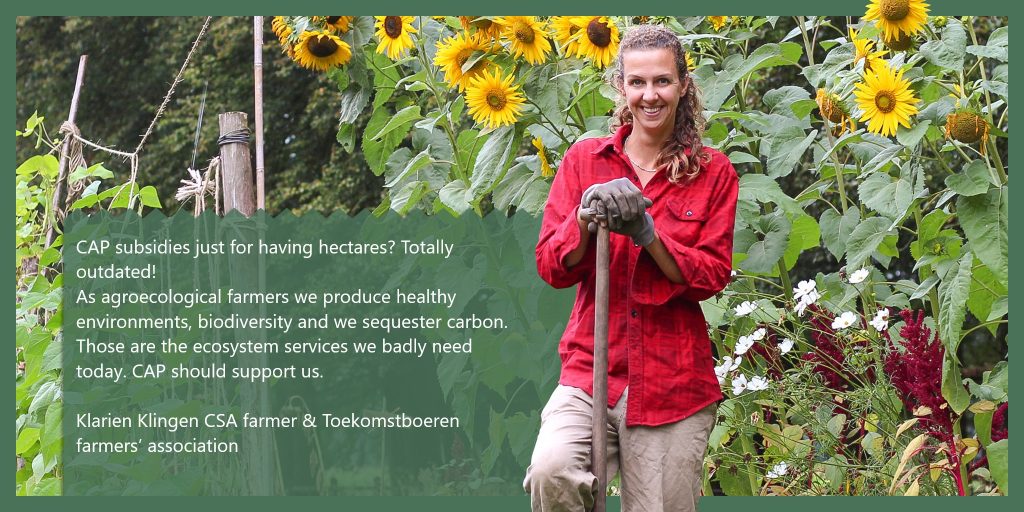
Conclusions
The COVID-19 crisis and current war in Ukraine have only increased the need to achieve greater regional self-sufficiency in essential basic necessity products such as food, medicines and medical equipment. The impending climate crisis will only add to that urgency.
With the outlined alternatives, the internalisation of environmental, labour and animal welfare costs in the consumer price can be combined with a fair and cost-effective price to farmers. It would mean a radical shift from the EU’s current corporate-driven agenda, in policy areas such as international trade, agriculture, climate, energy, employment and innovation. The good news is that we don’t need a bigger CAP budget, we only need to spend the current budget more effectively in order to reach environmental and social goals inside and outside the EU. Family farmers in the Global South and North would be supported to supply their own markets based on their natural resources and according to their own food cultures.
It is time that international human rights and environmental goals get priority above the rights of multinationals secured in current trade and investment treaties. It also makes perfect sense that governments protect the livelihoods of family farmers, small and medium enterprises and labourers against the unfair competition with transnational companies made possible by forced liberalisation. Trade is necessary, but let’s restrict it to the basic needs that can’t be self-produced and some unique, traditional products such as processed coffee and cocoa.
With this alternative, bridges can be built between the interests of family farmers, biodiversity and the environment, animals, civil society organisations and the Global South. The rules of the General Agreement on Tariffs and Trade, the predecessor of WTO, showed that another CAP and trade policy is possible.
 Guus Geurts studied Environmental Policy, is a publisher (author, photographer of World Food – Pledge for a Just and Environmental Friendly Food Supply (Dutch)), and campaigner in EU agriculture and trade policy. He is the coordinator of the Agriculture coalition for Just Trade (farmers’ organizations) and is involved with the Platform Aarde Boer Consument, Voedsel Anders NL, the Handel Anders!- the coalition and Working group Food Justice (all established in the Netherlands) and the (international) Seattle to Brussels network.
Guus Geurts studied Environmental Policy, is a publisher (author, photographer of World Food – Pledge for a Just and Environmental Friendly Food Supply (Dutch)), and campaigner in EU agriculture and trade policy. He is the coordinator of the Agriculture coalition for Just Trade (farmers’ organizations) and is involved with the Platform Aarde Boer Consument, Voedsel Anders NL, the Handel Anders!- the coalition and Working group Food Justice (all established in the Netherlands) and the (international) Seattle to Brussels network.
→ Read part 1 of the “A Just and Green CAP and Trade Policy in and Beyond the EU” series here.
[1] https://www.fern.org/publications-insight/landmark-eu-anti-deforestation-law-proposal-could-clean-up-supply-chains-could-it-also-reduce-global-deforestation-2431/#:~:text=A%20landmark%20law,caused%20deforestation%20or%20forest%20degradation
[2] https://www.greenpeace.org/static/planet4-eu-unit-stateless/2022/02/1e246d28-2022-02-03-greenpeace-briefing-eu-commission-deforestation-law.pdf
[3] https://www.veblen-institute.org/IMG/pdf/report_globalisationv4.pdf
[4] https://mathijsbouman.nl/pijnlijk-voor-liberale-economen-voor-een-effectief-klimaatbeleid-zijn-misschien-flinke-importheffingen-nodig/ and https://fd.nl/opinie/1380747/hoogste-tijd-voor-co2-belasting-op-vuile-import-ook-als-we-daarvoor-handelsregels-moeten-aanpassen-kqd1caiVtPza
[5] https://trade.ec.europa.eu/doclib/docs/2019/july/tradoc_158059.pdf
[6] https://www.euractiv.com/section/biofuels/news/eus-strict-green-criteria-for-biofuels-will-hinder-supply-meps-warn/
[7] Comments to this text by Niek Koning.
Download this article as a PDF
 This article is produced in cooperation with the
This article is produced in cooperation with the
Heinrich Böll Stiftung European Union.
More on CAP Strategic Plans
A Just and Green CAP and Trade Policy in and Beyond the EU: Part 1
Bulgaria’s CAP Strategic Plan: Backsliding on Nature and Biodiversity
Changes “required” to Ireland’s CAP Strategic Plan – European Commission
French CAP Plan: What Opportunities for Change During the New 2022-27 Presidential Term?
CAP, Fairness and the Merits of a Unique Beneficiary Code – Matteo Metta on Ireland’s Draft Plan
ARC Launches New Report on CAP as Member States Submit Strategic Plans
Slashing Space for Nature? Ireland Backsliding on CAP basics
Quality Schemes – Who Benefits? Central America, Coffee and the EU
Civil Society Organisations Demand Open and Ambitious Approval of CAP Plans
CAP Strategic Plans: Germany Taking Steps in the Right Direction?
CAP Strategic Plans: Support to High-Nature-Value Farming in Bulgaria
Commission’s Recommendations to CAP Strategic Plans: Glitters or Gold?
German Environment Ministry Proposals For CAP Green Architecture
CAP Performance Monitoring and Evaluation Framework – EP Position
A Rural Proofed CAP post 2020? – Analysis of the European Parliament’s Position
CAP Beyond the EU: The Case of Honduran Banana Supply Chains
CAP | Parliament’s Political Groups Make Moves as Committee System Breaks Down
CAP & the Global South: National Strategic Plans – a Step Backwards?
CAP Strategic Plans on Climate, Environment – Ever Decreasing Circles
European Green Deal | Revving Up For CAP Reform, Or More Hot Air?
Climate and environmentally ambitious CAP Strategic Plans: Based on what exactly?
How Transparent and Inclusive is the Design Process of the National CAP Strategic Plans?

